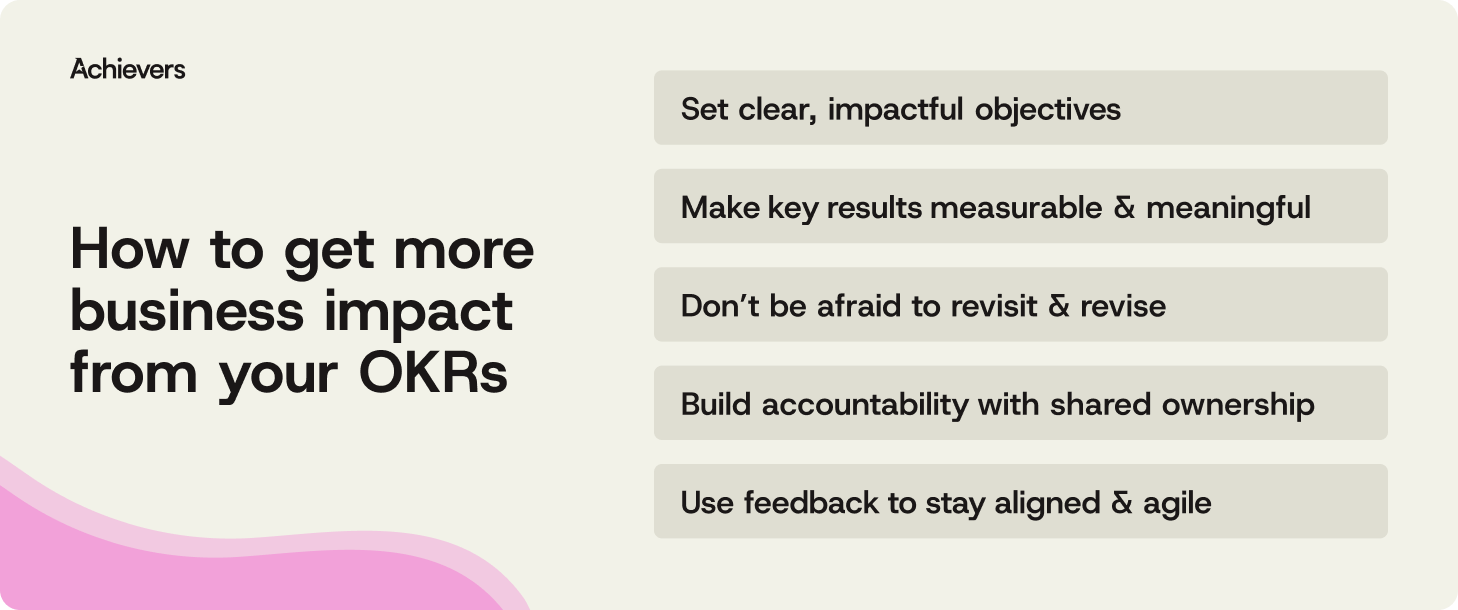Table of contents
Create a culture that means business™
Schedule a demo with an Achievers solution expert today.
OKR meaning — short for objectives and key results — gets tossed around a lot. But for many teams, it still feels like corporate alphabet soup. In reality, OKRs are one of the simplest, smartest ways to connect everyday work with what actually moves the business forward. Whether your goal is boosting revenue, sharpening customer experience, or sparking employee engagement, OKRs give your people a clear line of sight — and purpose.
At their best, they make strategy feel actionable, progress visible, and accountability shared. In this guide, we’ll unpack the OKR meaning and show you how to turn it from a buzzword into a business driver — with practical tips, examples, and best practices that bring true OKR meaning to life.
5 strategies to get more business impact from your OKRs
OKRs are everywhere — and yet, most companies still miss the mark. Maybe they’re too vague. Maybe no one checks in until it’s time to copy-paste them into the next planning doc. Or maybe they just don’t feel all that… relevant.
Here’s the truth: when done right, OKRs can be the heartbeat of your strategy — turning lofty goals into real progress and real business impact. Let’s walk through five ways to make sure they actually deliver:

1. Set clear, impactful objectives
If your objective is “increase revenue” or “improve engagement,” it’s time to aim higher — or at least, sharper. Generic goals get generic results. Strong objectives are grounded in purpose, tied to company priorities, and phrased in a way that makes people care.
Think “launch a customer-first renewal experience by Q3” instead of “improve customer experience.” That kind of clarity doesn’t just guide effort — it inspires it. And no, this isn’t about setting stretch goals so aggressive they make people sweat. It’s about ambition with direction. Bold, not blurry.
2. Make your key results measurable — and meaningful
A good key result tells you whether you’re actually making progress. A great one tells you whether that progress matters.
That means dropping vague action items like “host training sessions” and replacing them with outcomes like “increase post-training application rates by 30%.” If it’s not specific, time-bound, and tied to results, it’s just busywork in disguise.
Plus, the more clearly you define success, the easier it becomes to recognize and reward it. And that’s where momentum starts to build.
3. Don’t be afraid to revisit and revise OKRs
OKRs aren’t etched in stone — and they shouldn’t be. They’re meant to flex with your business. That’s part of what gives an OKR meaning its real value. When priorities shift or blockers pop up, your OKRs should adapt — not collect dust in a Google Sheet.
Make regular check-ins part of your rhythm. Mid-cycle reviews can help teams refocus, spot what’s working, and revise goals in real time. That kind of agility keeps teams aligned — and keeps your strategy honest.
4. Build accountability with shared ownership
The fastest way to make OKRs irrelevant? Hand them down like commandments from the top. The fastest way to make them stick? Build them together.
Co-creating OKRs with your team brings clarity, commitment, and a stronger sense of purpose. It turns “your goals” into “our goals.” And when people feel like they own the outcome, they’re far more likely to bring the energy needed to get there.
Make ownership visible, track progress openly, and highlight the wins — big or small. It builds trust, creates accountability, and gets everyone rowing in the same direction.
5. Use feedback to stay aligned — and agile
If you only look at OKR progress at the end of the quarter, you’ve already missed your window to course correct. Real-time feedback is your early warning system. It helps you understand where employees are engaged, where they’re stuck, and what’s getting in the way of progress.
The best way to gather that insight? Ask your people — and actually listen. Platforms like Achievers’ Voice of Employee solution make it easy to go beyond surface-level surveys with always-on feedback tools like surveys, quizzes, and polls. You get real-time insights into employee sentiment — and your people get to see their voices drive change.
That kind of transparency increases trust and gives teams the intel they need to adapt quickly, stay aligned with shifting priorities, and keep OKRs relevant — even when the ground is moving underneath them.
Turn OKRs into a culture driver
OKRs might live in a spreadsheet — but their real power plays out in your company culture. When they’re supported by real-time feedback and recognition, OKRs stop being a box-checking exercise and start shaping how people work, focus, and succeed together.
They create clarity around what matters. They align individual efforts with collective goals. And most importantly, they build the everyday habits that move strategy forward.
That’s where Achievers comes in. Our recognition platform connects goals with action — and action with impact — by helping teams recognize progress in real time, stay responsive with live insights, and build shared ownership of outcomes.
- Organizations using Achievers recognize 2x more often than those on other platforms — reinforcing the behaviors that drive OKR progress and accountability.
- Customers who adopt Achievers’ full feature set see up to 5x greater impact on engagement, retention, and performance.
- With built-in feedback tools, DEIB-supportive recognition options, and AI-powered insights, Achievers helps teams course-correct fast — without waiting for quarterly reviews.
- Our platform integrates directly into the tools your people already use — making recognition, tracking, and feedback feel less like “extra work” and more like everyday work.
Recognition alone doesn’t deliver results — but when it’s consistent, meaningful, and tied to business goals, it shapes the culture that gets results. That’s the Achievers difference.
From OKR meaning to meaningful results
OKRs aren’t just about setting goals — they’re about creating focus, building alignment, and helping people see how their work really makes an impact. When done right, they keep strategy from gathering dust in a slide deck and turn it into something your teams live and breathe.
But to really stick, OKRs need more than a kickoff meeting and a quarterly review. They need feedback loops. Visibility. Recognition. And a culture that doesn’t just track progress — it celebrates it.
That’s where Achievers comes in.
We help companies turn OKRs into something more than a planning tool — something that drives clarity, momentum, and shared success. With real-time recognition, built-in feedback, and integrated software tools that meet your people where they work, we make it easier to connect goals to action — and action to outcomes.



